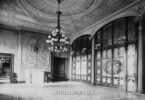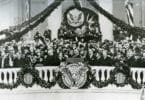Thomas Woodrow Wilson was born in Staunton, Virginia, on December 28, 1856. He was the third of four children born to Joseph Ruggles Wilson, a Presbyterian minister, and Janet Woodrow Wilson. The Wilson family moved frequently due to Joseph Wilson’s pastoral assignments, eventually settling in Augusta, Georgia.
Wilson’s early life was deeply influenced by his father’s religious devotion and his mother’s influence. He experienced the Civil War and Reconstruction firsthand, profoundly impacting his views on politics and governance. Struggling with dyslexia as a child, Wilson overcame this challenge with determination and hard work, eventually developing a passion for reading and learning.
After attending Davidson College in North Carolina for a year, Wilson transferred to Princeton University, where he graduated in 1879. He briefly studied law at the University of Virginia but left due to health issues. In 1886, Wilson earned his Ph.D. in political science from Johns Hopkins University, making him the only U.S. president to hold a doctorate. His academic career took off, and he became a respected professor and scholar, teaching at Bryn Mawr College and Wesleyan University before joining the faculty at Princeton. By 1902, Wilson had risen to the position of president at Princeton, where he initiated significant educational reforms.
In 1885, Wilson married Ellen Louise Axson, an accomplished artist and the daughter of a Presbyterian minister. Together, they had three daughters: Margaret, Jessie, and Eleanor. Ellen played a crucial role in Wilson’s personal and professional life, but her untimely death in 1914, during Wilson’s first presidential term, left him devastated. The following year, Wilson married Edith Bolling Galt, a widow who would become an indispensable support during his later years, especially as his health began to fail.
Wilson entered politics in 1910 when he was elected governor of New Jersey. His tenure was marked by progressive reforms, including establishing direct primaries, workers’ compensation, and regulation of public utilities. His success as governor quickly caught the attention of national Democratic leaders, leading to his nomination and election as president in 1912.
As president, Wilson pursued an ambitious domestic agenda known as the “New Freedom,” which focused on progressive reforms to address economic and social issues. His administration passed the Clayton Antitrust Act of 1914, strengthening laws against monopolies and protecting labor unions. He also oversaw the creation of the Federal Trade Commission (FTC) to regulate business practices and curb unfair competition. The Federal Reserve Act of 1913 established a central banking system regulating the U.S. economy today. The Underwood Tariff Act of 1913 also reduced tariffs and introduced a graduated income tax to reduce reliance on import duties.
World War I dominated Wilson’s second term. Initially, he sought to keep the U.S. neutral, but after continued German submarine attacks and the Zimmermann Telegram, which revealed a German plan to ally with Mexico against the U.S., he asked Congress for a declaration of war in April 1917. Wilson’s wartime leadership included mobilizing the economy and promoting the war effort. He also advocated for the Selective Service Act to build the military forces needed for the conflict.
In January 1918, Wilson outlined his vision for post-war peace through his Fourteen Points speech, which included principles like self-determination, free trade, and disarmament. His plan also called for establishing an international organization, the League of Nations, to prevent future conflicts. Though the League was established through the Treaty of Versailles in 1919, Wilson faced opposition at home, and the U.S. Senate refused to ratify the treaty, keeping the U.S. from joining the League.
Throughout his presidency, Wilson’s idealism and intellectual rigor shaped his approach to leadership. He believed deeply in the power of government to improve society and the importance of global cooperation to ensure peace. However, his refusal to compromise and stubbornness often created political obstacles.
Health issues began to overshadow Wilson’s later years in office. In October 1919, he suffered a debilitating stroke, leaving him partially paralyzed and impairing his judgment. His wife, Edith, stepped in to help manage his duties, effectively acting as a steward for the remainder of his term. After leaving office in 1921, Wilson retired to his home in Washington, D.C., where he continued to advocate for global peace and the League of Nations until his death on February 3, 1924, at the age of 67.
Wilson’s legacy is multifaceted. Domestically, his reforms reshaped the American economy and government, laying the groundwork for modern regulatory and welfare systems. Internationally, his vision for cooperation through the League of Nations was groundbreaking, even though the U.S. did not join. His ideas set the stage for future organizations like the United Nations. However, his legacy is also marred by his support for segregation and discriminatory practices in federal employment, which contrast sharply with his progressive domestic policies.
Despite these contradictions, Wilson had a lasting impact on American governance and global diplomacy. He was the first president to hold regular press conferences, starting in 1913, and in 1919, he was awarded the Nobel Peace Prize for his efforts in establishing the League of Nations. His visionary idealism and dedication to reform continue to influence political thought today.
Recommended Books on Woodrow Wilson
Woodrow Wilson: A Biography by John Milton Cooper Jr.
• This comprehensive biography by John Milton Cooper Jr. offers an in-depth look at Wilson’s life, political career, and presidency, highlighting his significant achievements and challenges.
• A. Scott Berg’s biography provides a detailed account of Wilson’s life, exploring his personal and political journey and the impact of his presidency on American history.
Woodrow Wilson: The American Presidents Series: The 28th President, 1913-1921 by H.W. Brands
• Part of The American Presidents Series, this concise biography by H.W. Brands offers an accessible overview of Wilson’s life and presidency.
Woodrow Wilson and the Roots of Modern Liberalism” by Ronald J. Pestritto
• This book explores Wilson’s political philosophy and its influence on modern liberalism, providing insights into his intellectual legacy.
Woodrow Wilson and World War I: A Burden Too Great to Bear by Richard Striner
• Richard Striner’s book examines Wilson’s leadership during World War I and his challenges in promoting his vision for global peace.







